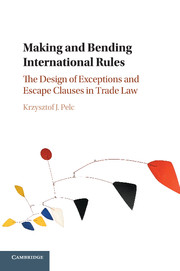Book contents
- Frontmatter
- Dedication
- Contents
- List of Tables
- Acknowledgments
- 1 The “Architectural Challenge” of International Rules
- 2 A Theory of the Design of Flexibility
- 3 A Brief Intellectual History of Flexibility in Law
- 4 The Twin GATT Exceptions: Fears and Solutions
- 5 The Evolving Design of Flexibility
- 6 The Bad News
- 7 The Good News
- 8 The Great Recession and Beyond
- Bibliography
- Index
8 - The Great Recession and Beyond
Published online by Cambridge University Press: 05 September 2016
- Frontmatter
- Dedication
- Contents
- List of Tables
- Acknowledgments
- 1 The “Architectural Challenge” of International Rules
- 2 A Theory of the Design of Flexibility
- 3 A Brief Intellectual History of Flexibility in Law
- 4 The Twin GATT Exceptions: Fears and Solutions
- 5 The Evolving Design of Flexibility
- 6 The Bad News
- 7 The Good News
- 8 The Great Recession and Beyond
- Bibliography
- Index
Summary
In the opening chapter, I spoke of the three paradoxes at the core of this book. Rules gain from being imperfect. Countries seek out flexibility provisions not in spite, but because of their constraints. And exceptions are designed to deal not with exceptional times per se, but rather with normalcy.
I demonstrated the first point by surveying a number of different legal issue-areas, paying special attention to those where one might not expect to see allowances made for circumstances: canon law, religious rules, just war theory, human rights law. All feature flexibility provisions of one form or another, and in all cases these lead to similar concerns about abuse, and solutions that share a set of common points. I then offered evidence for the second paradox of flexibility: loose exceptions in history have not fared well—not because they were abused, but because they fell into disuse. The doctrine of rebus sic stantibus has become nothing short of a taboo in international law, even as it is woven into some of its core provisions. The GATT national security exception is avoided by member states at all costs, even if it means being branded in violation. Comparing countries’ reliance on actionable trade remedies versus binding overhang suggests that to this day, countries find value in the constraints of flexibility provisions. Governments seek paperwork.
This brings me to the third paradox of flexibility, which I have highlighted less explicitly throughout the book, but which should be growingly apparent by now. The full meaning of the old maxim “necessity knows no law,” which retains much of its relevance today, is that no amount of legal design can do much to affect behavior in extraordinary circumstances. That is the essence of the incomplete contract. The aim of flexibility provisions is to identify valid necessity – extreme hunger in the biblical story of David and the showbread, unforeseen surges of imports in the trade regime – but not actually to affect behavior in its midst. Legal provisions may, at most, compel countries to do things like notify others of the occurrence of hard times and of the actions taken to address them. But they can do little to actually regulate behavior under those hard times. Rather, the concern is to delineate valid necessity, and avoid actions taken in its midst from spilling over. The concern is with what comes after a brush with necessity.
- Type
- Chapter
- Information
- Making and Bending International RulesThe Design of Exceptions and Escape Clauses in Trade Law, pp. 259 - 266Publisher: Cambridge University PressPrint publication year: 2016



